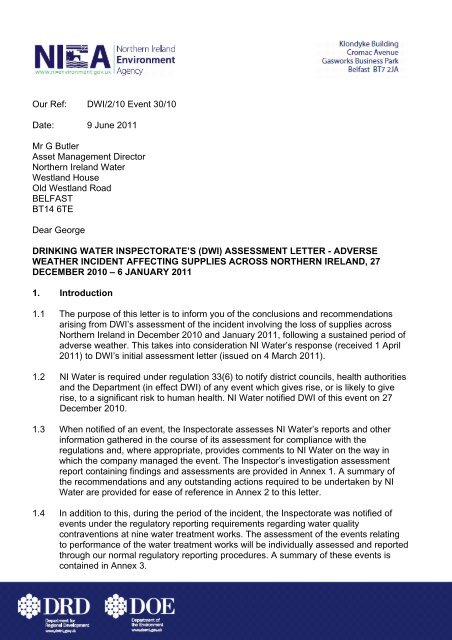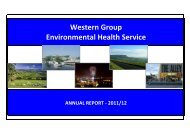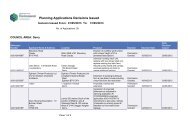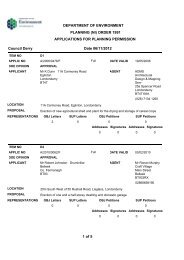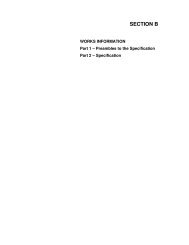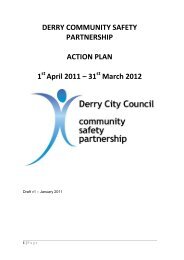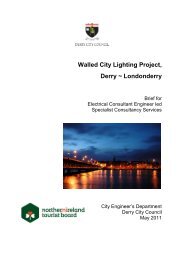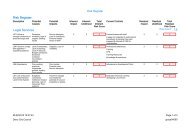Our Ref: DWI/2/10 Event 30/10 Date: 9 June ... - Derry City Council
Our Ref: DWI/2/10 Event 30/10 Date: 9 June ... - Derry City Council
Our Ref: DWI/2/10 Event 30/10 Date: 9 June ... - Derry City Council
Create successful ePaper yourself
Turn your PDF publications into a flip-book with our unique Google optimized e-Paper software.
<strong>Our</strong> <strong>Ref</strong>: <strong>DWI</strong>/2/<strong>10</strong> <strong>Event</strong> <strong>30</strong>/<strong>10</strong><br />
<strong>Date</strong>: 9 <strong>June</strong> 2011<br />
Mr G Butler<br />
Asset Management Director<br />
Northern Ireland Water<br />
Westland House<br />
Old Westland Road<br />
BELFAST<br />
BT14 6TE<br />
Dear George<br />
DRINKING WATER INSPECTORATE’S (<strong>DWI</strong>) ASSESSMENT LETTER - ADVERSE<br />
WEATHER INCIDENT AFFECTING SUPPLIES ACROSS NORTHERN IRELAND, 27<br />
DECEMBER 20<strong>10</strong> – 6 JANUARY 2011<br />
1. Introduction<br />
1.1 The purpose of this letter is to inform you of the conclusions and recommendations<br />
arising from <strong>DWI</strong>’s assessment of the incident involving the loss of supplies across<br />
Northern Ireland in December 20<strong>10</strong> and January 2011, following a sustained period of<br />
adverse weather. This takes into consideration NI Water’s response (received 1 April<br />
2011) to <strong>DWI</strong>’s initial assessment letter (issued on 4 March 2011).<br />
1.2 NI Water is required under regulation 33(6) to notify district councils, health authorities<br />
and the Department (in effect <strong>DWI</strong>) of any event which gives rise, or is likely to give<br />
rise, to a significant risk to human health. NI Water notified <strong>DWI</strong> of this event on 27<br />
December 20<strong>10</strong>.<br />
1.3 When notified of an event, the Inspectorate assesses NI Water’s reports and other<br />
information gathered in the course of its assessment for compliance with the<br />
regulations and, where appropriate, provides comments to NI Water on the way in<br />
which the company managed the event. The Inspector’s investigation assessment<br />
report containing findings and assessments are provided in Annex 1. A summary of<br />
the recommendations and any outstanding actions required to be undertaken by NI<br />
Water are provided for ease of reference in Annex 2 to this letter.<br />
1.4 In addition to this, during the period of the incident, the Inspectorate was notified of<br />
events under the regulatory reporting requirements regarding water quality<br />
contraventions at nine water treatment works. The assessment of the events relating<br />
to performance of the water treatment works will be individually assessed and reported<br />
through our normal regulatory reporting procedures. A summary of these events is<br />
contained in Annex 3.<br />
Page 1 of 7
1.5 Information was gathered during the course of this assessment from NI Water through<br />
regulatory reporting requirements, follow up discussions and written information<br />
requests. Other sources of information were also taken into consideration in making<br />
this assessment, these included the: Public Health Agency (PHA); Northern Ireland<br />
Authority for Utility Regulation (NIAUR); Consumer <strong>Council</strong> for Northern Ireland (CCNI)<br />
and; Northern Ireland Environment Agency (NIEA).<br />
1.6 I acknowledge that NI Water was asked to provide substantive information to others<br />
who have been tasked to investigate specific matters associated with this incident. I<br />
note the published report 1 by NIAUR (3 March 2011) contains key findings and a<br />
recovery plan relating to the cause for loss of supply and the performance of NI Water.<br />
2. Overview of the incident<br />
2.1 During December 20<strong>10</strong> and January 2011 adverse weather conditions prevailed<br />
across Northern Ireland which experienced extreme sub zero temperatures with<br />
December 20<strong>10</strong> registering as the coldest month on record. Across the region,<br />
prolonged frozen ground conditions followed by a rapid thaw caused major difficulties<br />
in maintaining the integrity of the water supply network. The output production of water<br />
treatment works was maximised, service reservoir storage levels were rapidly<br />
depleted and a significant number of water supply pipes burst, both within NI Water’s<br />
distribution network, and within customers’ properties. During the incident it is<br />
estimated that 215,000 properties experienced interruptions to their supply.<br />
2.2 As a consequence, the provision of drinking water supplies across Northern Ireland<br />
was affected and alternative water supplies had to be made available in many<br />
locations:<br />
<br />
<br />
<br />
<br />
50 tankers were used to augment supplies at water treatment works, service<br />
reservoirs and to fill static tanks;<br />
149 static tanks were deployed at 77 locations;<br />
water was also supplied to customers directly from tankers on one occasion;<br />
eight standpipes were put in place;<br />
over 820,000 litres of bottled water was made available, of which over 4<strong>10</strong>,000<br />
litres was distributed; and<br />
<br />
rotation of water supplies in a number of areas was introduced to enable a<br />
supply to be maintained and service reservoirs to recover.<br />
2.3 The production of normal water supply volumes rose rapidly because demand<br />
increased by over 200 million litres a day due to leakage in the network, together with<br />
bursts within private pipes. Water treatment works were operating at much higher than<br />
normal outputs (average daily distribution input of 620 million litres a day rising to a<br />
maximum of 862 million litres a day) during the incident.<br />
1 Utility Regulator's report of the investigation into the Freeze/Thaw incident 20<strong>10</strong>/11.pdf<br />
Page 2 of 7
2.4 To augment supplies at strategic locations, NI Water:<br />
<br />
<br />
<br />
<br />
<br />
tankered treated water into three water treatment works<br />
(Camlough WTWs, Carran Hill WTWs and Clay Lake WTWs);<br />
put two emergency sources (Glarryford and Cabragh Boreholes) back into<br />
supply;<br />
obtained treated water from Louth County <strong>Council</strong> and tankered it into Clay<br />
Lake WTWs;<br />
tankered treated water into 22 service reservoirs; and<br />
obtained temporary authorisation from NIEA to increase abstraction from two<br />
sources (River Derg and Lough Neagh) for production purposes at Derg and<br />
Dunore Point WTWs (the additional abstraction at Dunore was not required).<br />
2.5 During the incident final water quality at nine works was affected in the short term and<br />
where the standards were breached these were notified to the Inspectorate in<br />
accordance with regulatory reporting requirements. These are listed below:<br />
<br />
<br />
<br />
<br />
<br />
<br />
<br />
<br />
<br />
Cabragh / Gortlenaghan WTWs (iron and manganese);<br />
Carmoney WTWs (turbidity);<br />
Dorisland WTWs (aluminium);<br />
Caugh Hill WTWs (turbidity);<br />
Lough Macrory WTWs (aluminium);<br />
Ballinrees WTWs (aluminium);<br />
Dunore Point WTWs (aluminium);<br />
Lenamore Springs WTWs (turbidity); and<br />
Killylane WTWs (turbidity and aluminium).<br />
A range of problems at the WTWs including; instrument faults; response to alarms;<br />
freeze/thaw damage, effects of low temperature on the coagulation process; and<br />
increased production; which were all factors in one or more of these events. Annex 3<br />
to this letter provides additional summary detail relating to these events.<br />
2.6 Stocks of water normally available in many service reservoirs were severely depleted.<br />
Of the 3<strong>30</strong> service reservoirs monitored for compliance purposes 55 had less than<br />
0.5 metres storage capacity continuously for more than 24 hours.<br />
2.7 NI Water repaired bursts to its distribution network at:<br />
<br />
one trunk main;<br />
Page 3 of 7
286 distribution mains;<br />
880 communication pipes; and<br />
180 fittings.<br />
A significant number of bursts occurred on private property and these do not form part<br />
of this assessment. It is estimated that 80% of the additional water demand caused by<br />
the freeze/thaw leaked from domestic and business water pipes.<br />
3. Conclusions<br />
3.1 I note that, due to the complex nature and extent of this incident, and given the scale<br />
and operational demands, the company’s main priority was the restoration of water<br />
supplies and the delivery of alternative interim supply arrangements.<br />
3.2 While undertaking the many activities to restore supplies NI Water has also a duty to<br />
ensure that public health is protected through the provision of safe drinking water<br />
supplies and that appropriate mitigation measures are put in place to manage any risk<br />
of supplying water which could constitute a potential danger to human health.<br />
3.3 The post incident assessment undertaken by my inspectors is based on the currently<br />
available information and provides comment and makes recommendations on how<br />
NI Water carried out its drinking water quality regulatory duties. Since my initial<br />
assessment letter was issued seeking assurances, further information requirements<br />
and making recommendations to NI Water, several follow up actions are underway or<br />
have been completed.<br />
3.4 The follow up actions in Annex 2 are considered necessary to give the assurance that<br />
any key learning points from this incident are carried forwards to ensure regulatory<br />
compliance and uphold public confidence. It is necessary for NI Water to ensure that<br />
risks to public health are being robustly managed to prevent the potential<br />
contamination of drinking water supplies, particularly when normal operational<br />
conditions do not prevail. Pending satisfactory completion of the remaining follow up<br />
actions, the Inspectorate will proceed to close this incident file.<br />
3.5 The following paragraphs provide summary detail on the main aspects of the<br />
Inspectors assessment of this incident.<br />
3.6 Incident management<br />
3.6.1 NI Water had in place a Major Incident Plan (MIP). This provides the necessary<br />
framework to manage sufficiency and supply issues. Roles, responsibilities, tasks and<br />
activities are identified with the scientific adviser playing a key role in water quality<br />
matters.<br />
3.6.2 NI Water needs to have its MIP supported by the application of good operational<br />
procedures and that record keeping is carried out robustly throughout any incident.<br />
Page 4 of 7
3.6.3 During any incident it is incumbent upon NI Water to manage the risks to prevent the<br />
introduction of contamination into the water supply. It is paramount that the framework<br />
within the MIP is put into effective operation and that good communication and close<br />
liaison with relevant stakeholders is maintained. This is to enable appropriate and<br />
timely advice being given to protect consumers of any potential risk of contaminated<br />
water, and what action consumers can take during such emergency situations.<br />
3.6.4 The Inspectorate acknowledges that due to the scale of this incident there was an<br />
unprecedented demand placed on NI Water’s customers’ services which would<br />
normally record customers concerns and complaints. However, the Inspectorate is<br />
concerned that the systems that were in operation were unable to allow consumers<br />
concerns or complaints to be recorded as required in <strong>DWI</strong> Information Letter 01/11.<br />
This is a particular issue regarding the recording of information relating to the<br />
appearance of the water, given the potential for consumers to be concerned during<br />
incidents, as well as the considerations regarding the provision of ‘unfit’ water for<br />
human consumption.<br />
3.6.5 Given the large scale disruption and restoration of the distribution network during the<br />
incident, this may have caused concern for consumers who may have experienced<br />
problems with receiving discoloured water. It is the Inspectorate’s assessment that<br />
consumers would have benefited if they had been given information on what to expect<br />
during the disruption to normal services and when their water supplies were being<br />
restored. The Inspectorate recommends that NI Water reviews its communication of<br />
key messages such as ‘discolouration due to mains deposits’ or ‘cloudiness due to air’<br />
and also to consider giving advice on any steps consumers may take until the water<br />
quality returns to normal.<br />
3.7 Record keeping<br />
3.7.1 It is fundamental to recognize the importance of having effective record keeping at all<br />
levels. This applies, not only to staff in the incident room, but also to the management<br />
of all staff and resources, to ensure that the information requirements can be met.<br />
Records are kept to support the decisions that are taken during the incident of how<br />
risks are managed to avoid contamination. The information logs and data sheets also<br />
provide the necessary evidence to demonstrate that regulatory responsibilities have,<br />
or have not, been met.<br />
3.7.2 The Inspectorate recommends that robust records are required to provide information<br />
in support of actions NI Water took to manage the water quality aspect during this<br />
incident and has recommended that the relevant sections of the MIP on record<br />
keeping are reviewed. Significant gaps in documentation provision extended from<br />
communication logs on how decisions were made between NI Water and key<br />
stakeholders regarding public health protection, through to sufficiency of records to<br />
demonstrate compliance with the provision of alternative supplies.<br />
3.8 Risk management<br />
3.8.1 The Inspectorate assesses what measures NI Water has in place to manage any risk<br />
of supplying water which could constitute a potential danger to human health during<br />
the incident. A risk based approach needs to be applied to all of NI Water’s activities<br />
as it is paramount to safeguard consumers particularly where normal operational<br />
conditions do not prevail.<br />
Page 5 of 7
3.8.2 It is the Inspectorate’s assessment that, when a significant loss of supplies has been<br />
experienced, a comprehensive programme of water quality checks is necessary and<br />
that such an operational sampling programme should be related to the assessment of<br />
the potential risks to public health. The monitoring programme is necessary to verify<br />
that there has not been a breach of the integrity of the distribution network such as<br />
may be caused by: multiple repairs of burst pipework and fittings; valving operations;<br />
sediment disturbance when service reservoirs are being refilled following significant<br />
depletion; and reintroducing water into the distribution network.<br />
3.8.3 It is not evident from the information made available to the Inspectorate that such a<br />
robust programme was in place during this incident. The Inspectorate is concerned<br />
that there was a reliance on compliance monitoring, with no clear information available<br />
from any specific operational monitoring plan put in place during this incident. The<br />
Inspectorate therefore recommends that NI Water reviews its operational monitoring<br />
plan to take account of the specific circumstances which could be encountered during<br />
such emergency situations and that such a plan should take account of the<br />
assessment of the potential risks to public health.<br />
3.8.4 The Inspectorate has concerns in relation to how NI Water managed the risks<br />
associated with the provision of alternative supplies involving ‘third parties’. The<br />
Inspectorate recommends that NI Water undertake a review of how it can be assured<br />
that, during emergency situations when water is provided to consumers involving a<br />
‘third party’, it has the necessary checks and procedures in place to enable it to<br />
demonstrate to the Inspectorate that the water supplied is wholesome.<br />
3.9 Water treatment works performance<br />
3.9.1 NI Water was required to maximise output from its water treatment works during the<br />
incident. The majority of its works continued to produce high quality drinking water;<br />
however this increased production resulted in short term water quality issues at nine of<br />
the 31 works, due to factors such as: instrumentation faults; freeze/thaw damage;<br />
effectiveness of coagulation at lower temperatures; and operational response to<br />
process alarms. NI Water, through the ‘normal event reporting process, has identified<br />
to the Inspectorate what remedial action has been taken for each of these sites<br />
(Annex 3 refers).<br />
3.9.2 I would emphasise the importance of responding to malfunctions associated with the<br />
telemetry alarms systems especially when critical control alarms are not operational or<br />
are not triggered. This is particularly significant given the importance of the<br />
coagulation process and how it can be affected by many factors, including pH and low<br />
temperatures. I also would emphasise the criticality of optimal operational<br />
performance at water treatment works particularly when there are demands such as in<br />
emergency situations when extra throughput is required and normal working patterns<br />
may need to be adjusted to ensure integrity of the treatment processes.<br />
3.9.3 During this incident there was significant disruption to the production of water within<br />
water treatment works and in its storage and onward distribution. It is critical that, in all<br />
such circumstances, the disinfection process is not compromised. NI Water is<br />
required to ensure it has in place a disinfection policy to cover individual sites where<br />
disinfection is practised and to ensure that this extends to emergency situations where<br />
alternative supplies may be used.<br />
Page 6 of 7
4. General requirements<br />
4.1 Further action is required to be taken by NI Water and this is detailed in Annex 2 to<br />
this letter. Pending satisfactory completion of these requirements the Inspectorate will<br />
proceed to close this incident file.<br />
4.2 I am happy to discuss further any points the Inspectorate has raised through the<br />
assessment of this incident. Any enquiries should be addressed to me (9056 9294) or<br />
Colin Clements (9056 9242).<br />
4.3 Copies of this letter are being sent to the Director of Water Policy Division, DRD;<br />
Director of Environmental Protection (Northern Ireland Environment Agency); the<br />
Director of Water Regulation, NIAUR; the Director of the Public Health Agency; the<br />
Chief Environmental Health Officer, DHSSPS; the Head of Water, CCNI; and the Chief<br />
Environmental Health Officers.<br />
4.4 Please acknowledge receipt of this letter, by e-mail to <strong>DWI</strong>@doeni.gov.uk<br />
Yours sincerely<br />
Margaret Herron<br />
Chief Inspector of Drinking Water<br />
Drinking Water Inspectorate<br />
Page 7 of 7
Annex 1<br />
<strong>DWI</strong>’s OPERATIONAL INSPECTOR’S INVESTIGATION ASSESSMENT REPORT -<br />
ADVERSE WEATHER INCIDENT AFFECTING SUPPLIES ACROSS NORTHERN<br />
IRELAND, 27 DECEMBER 20<strong>10</strong> – 6 JANUARY 2011<br />
1. Incident management<br />
1.1 NI Water managed the incident caused by this loss of supply through its Major Incident<br />
Planning (MIP) and civil contingency processes: a level 3 incident team was<br />
established on 17 December 20<strong>10</strong> which involved management at a local level. On 26<br />
December 20<strong>10</strong> NI Water took the decision to escalate the incident to category 1 and<br />
on 27 December 20<strong>10</strong> an incident management team was established. An incident<br />
management Gold team was established at NI Waters Head Offices, with Silver and<br />
Bronze Teams mobilized in regional locations. The Inspectorate was advised that NI<br />
Water had scientific advisory representation within the MIP Gold Team in matters<br />
relating to ‘public health, drinking water quality regulation and water supply’ from the<br />
afternoon of 28 December 20<strong>10</strong>.<br />
1.2 Roles, responsibilities, tasks and activities are identified and assigned within NI<br />
Water’s MIP; this provides a framework to bring together people with the necessary<br />
skills and expertise. This makes provision for matters relating to water quality such as<br />
the provision of network management including alternative supplies, sampling and<br />
process control. Specific roles and duties are identified for the Scientific Advisor.<br />
1.3 There is also a duty to contact other stakeholders during an incident. This is of<br />
particular significance should there be any water quality matter that may give rise, or is<br />
likely to give rise, to a significant risk to human health. In such a case, the Public<br />
Health Agency and the Chief Environmental Health Officers would be contacted. There<br />
are well established procedures in place that are used to respond to contraventions of<br />
water quality parameters; this continued to be operational practice during the incident.<br />
This is a key role for the Scientific Advisor.<br />
1.4 The Civil Contingencies Group, which is the body set up to coordinate public sector<br />
organisations in an emergency, met on <strong>30</strong> December 20<strong>10</strong>.<br />
1.5 Throughout the incident, NI Water carried out significant operational work to get<br />
customers back onto mains water supply but operational water quality sampling was<br />
limited. In the circumstances, the Inspectorate would have expected a comprehensive<br />
operational water quality sampling programme to be implemented to ensure the risk to<br />
public health could be fully assessed. NI Water needs to have its MIP supported by the<br />
application of good operational procedures and that record keeping is carried out<br />
robustly throughout the incident.<br />
2. Alternative supplies<br />
2.1 NI Water’s regulatory obligations regarding the provision of safe drinking water<br />
supplies extends to water provided by the company in bottles or containers when there<br />
is an interruption to normal piped supplies. In practice this means:<br />
Page 1 of 9
water being used to fill tankers must meet the regulatory standards;<br />
the containers, from which water is being provided, are not contaminated, whether<br />
through the tanker material, the cleaning procedure, or through the filling process; and<br />
as a further safeguard to protect public heath, any precautionary advice should be<br />
given at the point at which the water is being made available to consumers.<br />
2.2 As part of this incident management many static tanks were used to provide drinking<br />
water supplies. In line with best practice it is important that static tanks are available in<br />
‘ready to use state’. This will mitigate against potential contamination issues and to<br />
assist deployment without unnecessary delays.<br />
2.3 All tanks from which customers can take water should be clearly labelled with<br />
appropriate ‘Boil Water Before Use’ signs to safeguard drinking water supplies, in<br />
accordance with good industry practice. This standard precaution is aimed at informing<br />
consumers of the need to safeguard against contamination introduced inadvertently by<br />
them when drawing off water into household containers and during subsequent<br />
storage and use. I note that, in the information NI Water has provided to the<br />
Inspectorate regarding the incident, all tanks and standpipes were labelled with “Boil<br />
Before Use” notices.<br />
2.4 Tanks should only be filled by, or under the control of NI Water staff. NI Water<br />
tankered water to water treatment works, service reservoirs and static tanks.<br />
NI Water’s report to the Inspectorate of the incident refers to static tanks being filled by<br />
councils and by the Northern Ireland Fire and Rescue Service. The Inspectorate has<br />
not been provided with information to demonstrate what arrangements NI Water had in<br />
place to ensure that any water being provided through the companies static tanks and<br />
provided by third parties was wholesome. The Inspectorate required an assurance<br />
from NI Water that appropriate arrangements were in place.<br />
2.5 The Inspectorate has concerns in relation to how NI Water managed the risks<br />
associated with the provision of alternative supplies involving ‘third parties’. The<br />
Inspectorate recommends that NI Water undertake a review of how it can be assured<br />
that, where in emergency situations when water is provided to consumers involving a<br />
‘third party’, it has the necessary checks and procedures in place to enable it to<br />
demonstrate to the Inspectorate, through appropriate records and evidence, that the<br />
water supplied is wholesome.<br />
2.6 Bottled water was made available from 27 December 20<strong>10</strong> from the following sources:<br />
<br />
<br />
<br />
NI Water’s emergency stock supply (<strong>10</strong>0,800 litres);<br />
two bottled water companies within Northern Ireland (261,238 litres); and<br />
Scottish Water (459,840 litres).<br />
Over 821,878 litres of bottled water were made available, of which, 411,878 litres were<br />
distributed. Within the Incident Management Team, the Networks Operations Advisor<br />
has overall responsibility for alternative supplies. The Alternative Supplies Task<br />
Leader organises the distribution of bottled water supplies. Requirements for record<br />
keeping purposes regarding water quality matters were managed by the Scientific<br />
Advisor.<br />
Page 2 of 9
3. Water treatment works performance<br />
3.1 The following is a list of nine water treatment works where contraventions were<br />
reported and events notified through normal reporting procedures during the period of<br />
this incident. Further assessment of these events will be undertaken by the<br />
Inspectorate through normal assessment and reporting procedures.<br />
3.2 During the incident final water quality at nine works was affected in the short term and<br />
where the standards were breached these were notified to the Inspectorate in<br />
accordance with regulatory reporting requirements. These are listed below:<br />
<br />
<br />
<br />
<br />
<br />
<br />
<br />
<br />
<br />
Cabragh / Gortlenaghan WTWs (iron and manganese);<br />
Carmoney WTWs (turbidity);<br />
Dorisland WTWs (aluminium);<br />
Caugh Hill WTWs (turbidity);<br />
Lough Macrory WTWs (aluminium);<br />
Ballinrees WTWs (aluminium);<br />
Dunore Point WTWs (aluminium);<br />
Lenamore Springs WTWs (turbidity); and<br />
Killylane WTWs (turbidity and aluminium).<br />
A range of problems at the WTWs including: instrument faults; response to alarms;<br />
freeze/thaw damage: effects of low temperature on the coagulation process; and<br />
increased production, were all factors in one or more of these events.<br />
4. Distribution networks / systems recovery<br />
4.1 Throughout this incident there was significant disruption within the distribution network<br />
caused as water mains burst requiring repair, as operational changes were made as<br />
water was redistributed throughout the system or when water was re-introduced to<br />
networks following restoration of supplies. Such operations would have caused<br />
disturbance within the mains which may have led to water quality problems being<br />
encountered in some areas. As part of good operational practice, it is the<br />
Inspectorates opinion that NI Water should have robust procedures in place to<br />
mitigate, as best it can, against any risks of contamination being introduced into the<br />
distribution systems when undertaking these activities.<br />
4.2 It is the Inspectorates opinion that, when a significant loss of supplies has been<br />
experienced, a programme of water quality checks through an operational sampling<br />
programme is necessary, and that such a programme should be related to the<br />
assessment of the potential risks to public health. The monitoring programme is<br />
necessary to verify that there has not been a breach of the integrity of the distribution<br />
network such as may be caused by: multiple repairs of burst pipework and fittings;<br />
valving operations; sediment disturbance when service reservoirs are being refilled<br />
following significant depletion; and reintroducing water into the distribution network.<br />
4.3 It is not evident from the information provided that such a programme was in place<br />
during this incident. The Inspectorate is concerned that there appears to have been a<br />
reliance on compliance monitoring, with no clear information available on any specific<br />
Page 3 of 9
operational monitoring plan put in place during this incident. This has resulted in an<br />
incomplete evidence picture being presented by NI Water to give me the necessary<br />
assurance that risks were managed to protect public health. The Inspectorate also has<br />
concerns on the potential of consumers to be exposed to contaminated water within<br />
the distribution systems and what assessment NI Water had made to ensure<br />
consumers were protected as supplies were being restored. It is therefore<br />
recommended that NI Water reviews its operational monitoring plan to take account<br />
of the specific circumstances which could be encountered during such emergency<br />
situations and that such a plan should take account of the assessment of the potential<br />
risks to public health.<br />
4.4 NI Water has internal procedures for the repair of burst mains which detail the<br />
necessary hygienic procedures required to be followed in undertaking repairs as well<br />
as the requirement to obtain bacteriological samples at upstream and downstream<br />
points on completion of the repair (with the exception of simple split collar repairs<br />
where a positive pressure has been maintained throughout the repair and the<br />
appropriate hygienic procedures have been followed).<br />
4.5 The Inspectorate assessed the data provided in relation to the number of burst repairs<br />
carried out by NI Water and the number of samples taken following such repairs. The<br />
data returned to the Inspectorate details that there are a significant number (33%) of<br />
bursts where the required sampling did not take place.<br />
4.6 While NI Water’s current operating practices in relation to sampling after bursts are in<br />
line with best industry practice, the Inspectorate is concerned that this was not<br />
followed in all instances, in that not all burst repairs were sampled after the work was<br />
completed. An assurance is required that the risk of water being supplied to<br />
consumers during this incident was considered by NI Water. The Inspectorate<br />
recommends that operational procedures in dealing with repairs in incident<br />
emergency situations are reviewed in liaison with PHA and the Inspectorate.<br />
4.7 In following best industry practice, and in compliance with NI Water’s ‘Section 1903:<br />
Water Supply Hygiene Precautions’, staff or personnel involved in restricted operations<br />
(i.e. work which may involve direct contact with fully treated water within WTWs or at<br />
any stage in its distribution) should possess a current certificate of medical suitability<br />
and have received appropriate training in hygiene procedures. It is NI Water’s<br />
responsibility to ensure all staff involved in restricted operations has suitable medical<br />
clearance and training. The Inspectorate recommends that NI Water review its<br />
emergency procedures to ensure this requirement was met for those staff involved in<br />
restricted operations.<br />
4.8 Given the extent and nature of this incident, disruption to supplies would be<br />
unavoidable in order to ensure consumers were placed back on supply as soon as<br />
possible. NI Water should be assured that its operational procedures, where possible,<br />
are planned and co-ordinated to ensure that the potential for ‘discoloured water’ issues<br />
for consumers is kept to a minimum.<br />
4.9 To ensure there was no adverse affect on water quality during refilling operations at<br />
service reservoirs (particularly at levels
Inspectorate is not aware of any operational procedures which may have been in<br />
place to reduce the impact of such filling operations or that a comprehensive sampling<br />
plan was in place to ensure that the quality of water being further distributed was not<br />
adversely affected. It is recommended that NI Water carries out a review of these<br />
operational procedures.<br />
4.<strong>10</strong> The restoration of the distribution networks systems in this incident was complex<br />
because of the unprecedented number of bursts. In restoring supplies there would be<br />
a number of potential problems which should be taken into consideration and<br />
assessed by NI Water such as:<br />
<br />
<br />
<br />
<br />
valve operations within the distribution in order to restore and move water<br />
throughout the network;<br />
potential disturbance of mains sediment with any consequences considered for<br />
water quality issues such as dirty water;<br />
occurrence of possible airlocks; and<br />
back siphonage issues especially from “high fluid risk categories” including dual<br />
supplies (private water supplies).<br />
The Inspectorate has not assessed NI Water’s response to the above points in detail<br />
but requires an assurance from NI Water that these issues have been considered in<br />
the management of this incident.<br />
5. Regulatory Requirements of The Water Supply (Water Quality) Regulations<br />
(Northern Ireland) 2007 as Amended<br />
5.1 Regulation 4 - Wholesomeness<br />
5.1.1 NI Water has a duty to provide wholesome water through its distribution network and<br />
this duty also extends to water supplied by other means when alternative provision<br />
arrangements are put in place by the water supplier, such as water made available to<br />
consumers by bottled water and containers.<br />
5.1.2 Regarding the quality of water supplied during the period of the incident, normal<br />
reporting and assessment procedures apply to investigations of all contraventions.<br />
The following 34 contraventions were notified to the Inspectorate:<br />
21 at water treatment works - aluminium (7), turbidity (5), manganese (5); and<br />
iron (4);<br />
5 at service reservoirs - aluminium (2) and iron (3);<br />
7 at customer taps - aluminium (6) and iron (1); and<br />
1 at a static tank - turbidity.<br />
5.2 Alternative supplies<br />
5.2.1 Bottled waters: The information provided does not detail that test results were<br />
available for all the bottled waters and, therefore, the Inspectorate is unable to assess<br />
that all water provided was wholesome. From the information provided there is no<br />
evidence to suggest that any water supplied through bottled water was unwholesome.<br />
However the Inspectorate is concerned that no test results were provided for water<br />
Page 5 of 9
supplied from one supplier over a four day period. It is recommended that NI Water<br />
should ensure that appropriate records are kept to demonstrate that the water supplied<br />
is wholesome.<br />
5.2.2 Tankering and static tanks: In order to verify that water supplied from tankers and<br />
static tanks is wholesome, there must be available evidence detailing that static<br />
tankers are cleaned and disinfected before filling with a verified source of wholesome<br />
water. In order for the Inspectorate to be assured of this, there must be in place<br />
detailed records on each static tank which would provide such assurance.<br />
NI Water advised the Inspectorate that static tanks were cleaned, disinfected, filled<br />
with wholesome water and were lockable but the records provided do not contain<br />
sufficient detail or cover all operations relating to the deployment of static tanks. The<br />
Inspectorate has no evidence to confirm that the necessary precautions were carried<br />
out. It is recommended that NI Water should review its procedures to ensure<br />
complete records are maintained for each tanker and static tank to verify that water<br />
supplied is wholesome.<br />
5.2.3 Standpipes: Standpipes used in an emergency must be kept specifically for that use,<br />
stored appropriately and cleaned and disinfected before use. Standpipes were made<br />
available in eight locations. NI Water has stated that all standpipes were labelled “Boil<br />
Before Use”.<br />
5.3 Regulation 6 Monitoring: general provisions<br />
5.3.1 NI Water has a duty under its monitoring requirements to put in place a schedule for<br />
sampling where distribution within a water supply zone is through tankers. Regulations<br />
6(3) and 6(4) contain the requirements for the frequency of sampling from tankers.<br />
Regulatory guidance 1 defines tankers as any mobile water tank used to supply water<br />
to consumers on a temporary basis. Tankers should only be filled with wholesome<br />
water.<br />
5.3.2 In order to demonstrate compliance with this regulation, NI Water must keep detailed<br />
records as contained with the regulatory guidance on the deployment of each tanker<br />
and static tank. Within the MIP there are logs to be completed when alternative supply<br />
arrangements are put into operation. The documentation submitted as part of this<br />
investigation does not provide the necessary details to allow a judgement to be made<br />
on whether, on all occasions, this regulatory duty was complied with. It is<br />
recommended that NI Water should review its record keeping, ensuring that it<br />
contains sufficient detail for the deployment of all tankers and static tanks.<br />
5.3.3 Where re-zoning is considered necessary as part of the operational practices in<br />
managing the incident, an assessment should be made by NI Water to consider if any<br />
adjustment is necessary to the routine statutory monitoring programme. Based on the<br />
information provided, NI Water has stated that the re-zoning of water supplies was<br />
covered by minor boundary changes. It is recommended that, where re-zoning is<br />
being planned, an operational sampling plan is considered to cover any water quality<br />
issues that may be caused by reversing flows etc.<br />
1 Guidance on the Water Supply (Water Quality) Regulations (Northern Ireland) 2007<br />
Page 6 of 9
5.3.4 The PHA advised NI Water on 31 December 20<strong>10</strong> that there should be increased<br />
monitoring at Clay Lake WTWs and enhanced monitoring in the distribution systems<br />
and this was also to apply to other WTWs receiving tankered water. After this date,<br />
Carran Hill WTWs was sampled daily and Clay Lake WTWs was sampled daily except<br />
for 4 January 2011. However, Camlough WTWs was not sampled on the 1, 2 or 3<br />
January 2011 and there were no additional distribution samples taken. The<br />
Inspectorate requested an explanation as to why these additional samples were not<br />
taken.<br />
5.4 Regulation 15 Sampling: new sources<br />
NI Water has a responsibility to ensure it has taken adequate precautions before<br />
bringing sources into supply which are not currently in use. Regulation 15 requires NI<br />
Water to put in place appropriate monitoring of any new source, either before bringing<br />
in the source, or as soon as practicable afterwards. NI Water may, however, bring in<br />
new sources as a matter of urgency in order to prevent an unexpected interruption in<br />
supply, but this may only be done in circumstances where a regulation 27 risk<br />
assessment has been carried out.<br />
In bringing in the Cabragh and Glarryford boreholes, as these supplies had not been in<br />
use for the preceding 6 months, NI Water was required to have undertaken monitoring<br />
and a risk assessment. Appropriate monitoring was undertaken for these boreholes to<br />
enable these supplies to be brought into service.<br />
5.5 Regulation 16 Collection and analysis of samples<br />
This regulation details specific requirements for the collection and analysis of samples.<br />
The Inspectorate requires an assurance from NI Water that all personnel, including<br />
contractors, who were taking samples during the incident, had been accredited to<br />
undertake sampling or had undergone appropriate training, and that samples were<br />
taken, handled and transported appropriately in compliance with this regulation.<br />
5.6 Regulation 17 and 18 Investigations<br />
Where NI Water has reason to believe that the water supplied fails, or is likely to fail,<br />
to meet the standards of wholesomeness specified in the regulations, it is required to<br />
investigate the cause of that failure or likely failure. Normal reporting and assessment<br />
procedures apply to investigations of all contraventions. 34 contraventions were<br />
notified to the Inspectorate under these regulations.<br />
5.7 Regulation 26 Disinfection and other treatment arrangements<br />
5.7.1 Regulation 26 requires NI Water to ensure that any disinfection process carried out at<br />
any site is effective and that there is documented evidence to demonstrate verification<br />
of the performance of the disinfection process. The regulation also requires that all<br />
water supplied for Regulation 4(1) purposes (Wholesomeness) is disinfected.<br />
5.7.2 No documentation was provided by NI Water to demonstrate verification of<br />
disinfection. NI Water is required to meet the requirements regarding verification of<br />
Page 7 of 9
the disinfection process as contained within <strong>DWI</strong> Information Letter 06/<strong>10</strong>. This should<br />
form part of NI Water’s disinfection policy.<br />
5.7.3 The Inspectorate has concerns that, in replenishing service reservoirs and in<br />
recharging the distribution network during the incident, the chlorine demand may have<br />
been affected within reservoirs and onward distribution. The Inspectorate requires<br />
further information from NI Water into what controls were in place to ensure<br />
disinfection was not compromised during this process.<br />
5.8 Regulation <strong>30</strong> Application and introduction of substances and products<br />
Regulation <strong>30</strong> specifies the circumstances in which NI Water may apply or introduce<br />
substances or products into water supplies for cooking, drinking, food preparation or<br />
washing. This includes water supplied in bottles or containers. The Inspectorate<br />
requires an assurance that this regulation was met regarding all substances and<br />
products utilised during the incident.<br />
5.9 Regulation 33 Provision of information<br />
5.9.1 Under regulation 33(6)(a) NI Water is required to notify the health authorities; every<br />
appropriate district council; and <strong>DWI</strong> of an event which gives rise, or is likely to give<br />
rise, to a significant risk to human health.<br />
5.9.2 We have insufficient information to confirm when NI Water first contacted the Public<br />
Health Agency in relation to this incident. The Inspectorate requires NI Water to<br />
provide information to confirm that the PHA was contacted “as soon as possible” after<br />
the event was declared.<br />
5.9.3 In NI Water’s incident investigation report it states that notifications were made to the<br />
25 district council areas affected; however there were no records provided to<br />
document these notifications. The Inspectorate requires NI Water to maintain a<br />
comprehensive event log to demonstrate that the appropriate contacts were made.<br />
5.9.4 The Inspectorate acknowledges the substantial information provided by NI Water from<br />
27 December 20<strong>10</strong> on a daily basis until the end of the incident including regular<br />
updates of the overall situation via the “Upward Reports”.<br />
5.9.5 There are circumstances where NI Water takes advice from the PHA and restrictions<br />
or precautionary restrictions are put in place by the company to protect public health in<br />
matters relating to drinking water quality. Following communications between NI Water<br />
and the PHA, general ‘Boil Water Before Use’ advice was made available through the<br />
PHA’s website on 29 December 20<strong>10</strong>; however it was not made available on NI<br />
Water’s website until 31 December 20<strong>10</strong>.<br />
5.9.6 It is the Inspectorate’s opinion that there was not sufficient information made available<br />
to the public in those areas where mains were being repaired. Consumers should<br />
have been made aware, for example, that temporary discolouration may be<br />
experienced as supplies are reconnected and restored to normal operations. They<br />
should also have been advised whether there was a need to take any precautionary<br />
measures such as boiling the water before use. It is recommended that NI Water<br />
Page 8 of 9
takes into consideration a review of this aspect of consumer communications within<br />
the work currently being undertaken by a sub group of the Drinking Water Liaison<br />
Group that is providing guidance to health professionals and those in the water<br />
industry in Northern Ireland.<br />
5.9.7 NI Water advised the Inspectorate that the Drinking Water and Health Guidance<br />
Document should be reviewed to include lessons learnt dealing with this incident and<br />
the provision of health advice to customers. It is recommended that operational<br />
procedures should be reviewed and taken into consideration in the work currently<br />
being undertaken by the DWLG sub group. This review should reflect best water<br />
industry practice.<br />
6. Water unfit for human consumption<br />
6.1 NI Water is required to provide the Inspectorate with data relating to the complaints<br />
and concerns of its consumers. During the period of this incident the company has<br />
reported that there were 47 contacts made relating to the appearance of ‘black/brown/<br />
orange’ coloured water. Due to the unprecedented number of contacts being made to<br />
the company’s call handling centre, the Inspectorate is aware that only a percentage<br />
of incoming calls were answered. It is therefore impossible to know what percentage<br />
of calls, not getting through, were to make complaints or express water quality<br />
concerns. As the company has not provided sufficient information to demonstrate that<br />
all calls were correctly categorized, the Inspectorate cannot establish an accurate<br />
picture of what customers were experiencing.<br />
6.2 It is possible that some consumers may have rejected their water supply for drinking,<br />
cooking and other domestic purposes when supplies were restored. In considering the<br />
information provided by NI Water, there is a lack of sufficient reliable evidence that the<br />
company supplied water that was unfit for human consumption.<br />
6.3 It is recommended that the information recording procedures are reviewed to enable<br />
NI Water to ensure that all contacts, whether complaints or concerns, are categorized<br />
and recorded robustly particularly during incident situations.<br />
7. Other matters<br />
The Inspectorate, during the period of this investigation, notes that a ‘level 3’ incident<br />
was declared on 17 December 20<strong>10</strong> and that tankering to service reservoirs from 12<br />
December 20<strong>10</strong> to 13 January 2011 was ongoing. The Inspectorate was not notified<br />
when this initial tankering operation commenced on 12 December 20<strong>10</strong>. It is the<br />
Inspectorate’s opinion that NI Water should contact <strong>DWI</strong> as soon as it is aware of a<br />
notifiable problem, or a developing situation, which might become notifiable. In<br />
circumstances where tankering is commenced to service reservoirs, this would be<br />
notifiable.<br />
COLIN CLEMENTS<br />
Operations Inspector<br />
17 May 2011<br />
Page 9 of 9
Annex 2<br />
<strong>DWI</strong> FINAL ASSESSMENT SUMMARY - ADVERSE WEATHER INCIDENT AFFECTING SUPPLIES ACROSS NORTHERN<br />
IRELAND, 27 DECEMBER 20<strong>10</strong> – 6 JANUARY 2011<br />
<strong>DWI</strong> Requirement/ Recommendation<br />
in Initial Assessment Letter of<br />
4 March 2011<br />
Summary of NI Water<br />
Response received<br />
1 April 2011<br />
<strong>DWI</strong> Assessment of<br />
NI Water Response<br />
Further Action Required<br />
Alternative Supplies<br />
3.2.4 <strong>DWI</strong> requires an assurance from<br />
NI Water that appropriate<br />
arrangements are in place to ensure<br />
that any water being provided through<br />
the company’s static tanks and<br />
provided by third parties is wholesome.<br />
This issue will be<br />
considered as part of the<br />
Major Incident Plan (MIP)<br />
review. <strong>DWI</strong> to be<br />
informed when the review<br />
is completed.<br />
Insufficient information<br />
has been recorded by NI<br />
Water to allow a full<br />
assessment to be made in<br />
relation to third parties<br />
providing water through NI<br />
Water’s static tanks. <strong>DWI</strong><br />
notes that NI Water will<br />
consider this issue as part<br />
of its MIP review.<br />
NI Water to provide an update<br />
of the relevant section of the<br />
MIP when it is completed.<br />
In the interim, NI Water<br />
should ensure it adheres to<br />
Water UK Technical<br />
Guidance Note No. 12<br />
regarding tankers, static tanks<br />
and bowsers.<br />
Action status: Ongoing, NI<br />
Water to provide review<br />
progress update at<br />
NIW/<strong>DWI</strong> AMD Meeting 22<br />
<strong>June</strong> 2011<br />
1 of <strong>10</strong>
Annex 2<br />
<strong>DWI</strong> FINAL ASSESSMENT SUMMARY - ADVERSE WEATHER INCIDENT AFFECTING SUPPLIES ACROSS NORTHERN<br />
IRELAND, 27 DECEMBER 20<strong>10</strong> – 6 JANUARY 2011<br />
<strong>DWI</strong> Requirement/ Recommendation<br />
in Initial Assessment Letter of<br />
4 March 2011<br />
Summary of NI Water<br />
Response received<br />
1 April 2011<br />
<strong>DWI</strong> Assessment of<br />
NI Water Response<br />
Further Action Required<br />
Distribution Networks / Systems<br />
Recovery<br />
3.4.5 <strong>DWI</strong> requires an assurance that<br />
the risk of supplying water to<br />
customers during the incident was<br />
considered, and recommended that<br />
operational procedures were reviewed<br />
in liaison with Public Health Agency<br />
(PHA) and the Inspectorate.<br />
Assurance given<br />
regarding risk<br />
assessments and<br />
refers to mitigation<br />
measures. To be raised at<br />
the next meeting of the<br />
interagency Drinking<br />
Water Liaison Group<br />
(DWLG).<br />
NI Water did not provide<br />
sufficient detail as to how<br />
the assessment of risk<br />
was fully considered.<br />
Reliance on compliance<br />
samples and the limited<br />
operational samples taken<br />
during the period of the<br />
incident was in <strong>DWI</strong>s<br />
assessment insufficient to<br />
enable a full evaluation of<br />
the risks to be considered.<br />
These were not normal<br />
operating conditions and<br />
for example sampling<br />
downstream following<br />
repair several days later<br />
(or not at all) would not<br />
fully inform the risk of<br />
potentially contaminated<br />
water being present for<br />
consumers.<br />
NI Water to outline its<br />
procedures on its assessment<br />
of the risk of supplying<br />
unwholesome water during an<br />
incident taking account of its<br />
assessment of how this could<br />
constitute a danger to public<br />
health. This update to be<br />
provided at the next meeting<br />
of the DWLG in <strong>June</strong> 2011.<br />
Action status: Ongoing<br />
2 of <strong>10</strong>
Annex 2<br />
<strong>DWI</strong> FINAL ASSESSMENT SUMMARY - ADVERSE WEATHER INCIDENT AFFECTING SUPPLIES ACROSS NORTHERN<br />
IRELAND, 27 DECEMBER 20<strong>10</strong> – 6 JANUARY 2011<br />
<strong>DWI</strong> Requirement/ Recommendation<br />
in Initial Assessment Letter of<br />
4 March 2011<br />
Summary of NI Water<br />
Response received<br />
1 April 2011<br />
<strong>DWI</strong> Assessment of<br />
NI Water Response<br />
Further Action Required<br />
Distribution Networks / Systems<br />
Recovery<br />
3.4.6 <strong>DWI</strong> recommended that NI<br />
Water reviewed its emergency<br />
procedures regarding the medical<br />
screening and hygiene training of staff<br />
involved in restricted operations.<br />
All NI Water and<br />
Contractor’s employees<br />
carrying out work in<br />
restricted operations must<br />
be registered under the<br />
National Water Hygiene<br />
Scheme and carry the<br />
card. This will be<br />
considered as part of the<br />
MIP review and <strong>DWI</strong><br />
informed when the review<br />
is completed.<br />
<strong>DWI</strong> accepts the<br />
assurance that all NI<br />
Water and Contractor’s<br />
employees must be<br />
registered under the<br />
National Water Hygiene<br />
Scheme and carries the<br />
card.<br />
NI Water to provide an update<br />
of the relevant section of the<br />
MIP when it is completed.<br />
Action status: NI Water to<br />
provide review progress<br />
update at NIW/<strong>DWI</strong> AMD<br />
Meeting 22 <strong>June</strong> 2011<br />
3 of <strong>10</strong>
Annex 2<br />
<strong>DWI</strong> FINAL ASSESSMENT SUMMARY - ADVERSE WEATHER INCIDENT AFFECTING SUPPLIES ACROSS NORTHERN<br />
IRELAND, 27 DECEMBER 20<strong>10</strong> – 6 JANUARY 2011<br />
<strong>DWI</strong> Requirement/ Recommendation<br />
in Initial Assessment Letter of<br />
4 March 2011<br />
Summary of NI Water<br />
Response received<br />
1 April 2011<br />
<strong>DWI</strong> Assessment of<br />
NI Water Response<br />
Further Action Required<br />
Distribution Networks / Systems<br />
Recovery<br />
3.4.8 <strong>DWI</strong> recommended that NI<br />
Water reviewed its operational<br />
procedures regarding tankering into<br />
service reservoirs including operational<br />
monitoring.<br />
NI Water follows good<br />
operational practice during<br />
filling operations. Routine<br />
compliance monitoring<br />
was carried out. Suggest<br />
we discuss with DWLG<br />
and incorporate into<br />
Guidance Document for<br />
Water and Health<br />
Professionals.<br />
<strong>DWI</strong>’s opinion is that<br />
routine compliance<br />
samples are not sufficient<br />
when there is significant<br />
operational work ongoing.<br />
A comprehensive<br />
programme of water<br />
quality checks through a<br />
robust operational<br />
sampling programme is<br />
required.<br />
NI Water to outline its<br />
proposals regarding<br />
mitigation of the risk of<br />
tankering into service<br />
reservoirs at the next meeting<br />
of the DWLG in <strong>June</strong> 2011.<br />
Action status: Ongoing<br />
3.4.9 <strong>DWI</strong> required an assurance<br />
regarding the restoration of supplies<br />
and the potential impact on water<br />
quality.<br />
NI Water carry out<br />
continual risk<br />
assessments on the<br />
possible impacts of<br />
networks operations on<br />
water quality.<br />
NI Water did not provide<br />
sufficient detail as to how<br />
the assessment of risk<br />
was fully considered.<br />
Reliance on compliance<br />
samples and the limited<br />
operational samples taken<br />
during the period of the<br />
incident was in <strong>DWI</strong>s<br />
assessment insufficient to<br />
enable a full evaluation of<br />
the risks to be considered.<br />
NI Water to outline its<br />
proposals regarding the risk<br />
assessment process<br />
at the next meeting of the<br />
DWLG in <strong>June</strong> 2011.<br />
Action status: ongoing<br />
4 of <strong>10</strong>
Annex 2<br />
<strong>DWI</strong> FINAL ASSESSMENT SUMMARY - ADVERSE WEATHER INCIDENT AFFECTING SUPPLIES ACROSS NORTHERN<br />
IRELAND, 27 DECEMBER 20<strong>10</strong> – 6 JANUARY 2011<br />
<strong>DWI</strong> Requirement/ Recommendation<br />
in Initial Assessment Letter of<br />
4 March 2011<br />
Summary of NI Water<br />
Response received<br />
1 April 2011<br />
<strong>DWI</strong> Assessment of<br />
NI Water Response<br />
Further Action Required<br />
Regulatory Requirements<br />
Alternative Supplies<br />
4.2.1 <strong>DWI</strong> recommended that<br />
appropriate records are kept to<br />
demonstrate bottled water supplies are<br />
wholesome.<br />
NI Water is currently<br />
reviewing its bottled water<br />
procedure to ensure<br />
appropriate records are<br />
maintained in the future.<br />
<strong>DWI</strong> notes that a review of<br />
bottled water is being<br />
undertaken by NI Water.<br />
NI Water to provide details of<br />
the review being carried out<br />
within 4 weeks of the date of<br />
this letter.<br />
Action status: Ongoing<br />
4.2.2 <strong>DWI</strong> recommended that NI<br />
Water should review its procedures to<br />
ensure complete records of cleaning,<br />
disinfection and filling of tankers and<br />
static tanks and locking of static tanks<br />
are maintained.<br />
NI Water will consider this<br />
as part of the MIP review.<br />
<strong>DWI</strong> notes that record<br />
keeping relating to tankers<br />
and static tanks will be<br />
considered as part of the<br />
MIP review.<br />
NI Water to provide an update<br />
of the relevant section of the<br />
MIP when it is completed.<br />
Action status: Ongoing, NI<br />
Water to provide review<br />
progress update at<br />
NIW/<strong>DWI</strong> AMD Meeting 22<br />
<strong>June</strong> 2011<br />
5 of <strong>10</strong>
Annex 2<br />
<strong>DWI</strong> FINAL ASSESSMENT SUMMARY - ADVERSE WEATHER INCIDENT AFFECTING SUPPLIES ACROSS NORTHERN<br />
IRELAND, 27 DECEMBER 20<strong>10</strong> – 6 JANUARY 2011<br />
<strong>DWI</strong> Requirement/ Recommendation<br />
in Initial Assessment Letter of<br />
4 March 2011<br />
Summary of NI Water<br />
Response received<br />
1 April 2011<br />
<strong>DWI</strong> Assessment of<br />
NI Water Response<br />
Further Action Required<br />
Regulation 6 Monitoring: General<br />
Provisions<br />
4.3.2 NI Water’s record keeping<br />
regarding the deployment of each<br />
tanker and static tank were insufficient<br />
to demonstrate compliance with<br />
Regulation 6, and <strong>DWI</strong> recommended<br />
NI Water reviewed its record keeping.<br />
NI Water will review its<br />
record keeping<br />
procedures to ensure a<br />
complete record of tankers<br />
and static tanks exists.<br />
<strong>DWI</strong> notes that a review is<br />
being undertaken.<br />
NI Water to provide details of<br />
the review being carried out<br />
within 4 weeks of the date of<br />
this letter.<br />
Action status: ongoing<br />
4.3.3 <strong>DWI</strong> recommended where rezoning<br />
is being planned, an operational<br />
sampling plan is considered.<br />
NI Water will consider<br />
increased monitoring in<br />
the distribution system<br />
during major boundary<br />
change operations<br />
through a risk based<br />
approach.<br />
<strong>DWI</strong> notes that NI Water<br />
will use a risk-based<br />
approach to operational<br />
sampling when re-zoning<br />
occurs.<br />
In any future event, NI Water<br />
must ensure that adequate<br />
operational sampling is<br />
carried out.<br />
Action status: no further<br />
action required<br />
6 of <strong>10</strong>
Annex 2<br />
<strong>DWI</strong> FINAL ASSESSMENT SUMMARY - ADVERSE WEATHER INCIDENT AFFECTING SUPPLIES ACROSS NORTHERN<br />
IRELAND, 27 DECEMBER 20<strong>10</strong> – 6 JANUARY 2011<br />
<strong>DWI</strong> Requirement/ Recommendation<br />
in Initial Assessment Letter of<br />
4 March 2011<br />
Summary of NI Water<br />
Response received<br />
1 April 2011<br />
<strong>DWI</strong> Assessment of<br />
NI Water Response<br />
Further Action Required<br />
Regulation 6 Monitoring: General<br />
Provisions<br />
4.3.4 <strong>DWI</strong> requested an explanation<br />
as to why the additional samples<br />
requested by the PHA at Camlough<br />
WTWs were not taken.<br />
NI Water advised that this<br />
was an oversight by the<br />
company.<br />
<strong>DWI</strong> accepts that this was<br />
an oversight.<br />
In any future event, NI Water<br />
must ensure that any<br />
additional operational<br />
sampling requested by PHA<br />
is carried out.<br />
Regulation 16 Collection and<br />
Analysis of Samples<br />
Action status: No further<br />
action required<br />
4.5 <strong>DWI</strong> required an assurance that all<br />
personnel taking samples during the<br />
incident were accredited.<br />
All samples were taken by<br />
SERCO who are UKAS<br />
accredited.<br />
<strong>DWI</strong> accepts the<br />
assurance given.<br />
Action status: No further<br />
action required<br />
7 of <strong>10</strong>
Annex 2<br />
<strong>DWI</strong> FINAL ASSESSMENT SUMMARY - ADVERSE WEATHER INCIDENT AFFECTING SUPPLIES ACROSS NORTHERN<br />
IRELAND, 27 DECEMBER 20<strong>10</strong> – 6 JANUARY 2011<br />
<strong>DWI</strong> Requirement/ Recommendation<br />
in Initial Assessment Letter of<br />
4 March 2011<br />
Summary of NI Water<br />
Response received<br />
1 April 2011<br />
<strong>DWI</strong> Assessment of<br />
NI Water Response<br />
Further Action Required<br />
Regulation 26 Disinfection and<br />
Other Treatment Arrangements<br />
4.7.3 <strong>DWI</strong> required further information<br />
as to what controls were in place to<br />
ensure disinfection was not<br />
compromised when service reservoirs<br />
were being replenished.<br />
NI Water gives an<br />
assurance that public<br />
health is its primary<br />
concern and operational<br />
practices were closely<br />
monitored to minimise<br />
potential water quality<br />
impacts. Chlorine<br />
residuals were monitored<br />
closely.<br />
No documentation was<br />
provided by NI Water to<br />
demonstrate verification of<br />
disinfection.<br />
NI Water is required to meet<br />
the regulatory requirements<br />
regarding verification of the<br />
disinfection process and<br />
outlined within <strong>DWI</strong><br />
Information Letter 06/<strong>10</strong>. This<br />
should form part of NI Water’s<br />
disinfection policy. NI Water<br />
to provide a timeframe for full<br />
implementation of the<br />
requirements of I/L 06/<strong>10</strong><br />
within 4 weeks of the date of<br />
this letter.<br />
Action status: ongoing<br />
8 of <strong>10</strong>
Annex 2<br />
<strong>DWI</strong> FINAL ASSESSMENT SUMMARY - ADVERSE WEATHER INCIDENT AFFECTING SUPPLIES ACROSS NORTHERN<br />
IRELAND, 27 DECEMBER 20<strong>10</strong> – 6 JANUARY 2011<br />
<strong>DWI</strong> Requirement/ Recommendation<br />
in Initial Assessment Letter of<br />
4 March 2011<br />
Summary of NI Water<br />
Response received<br />
1 April 2011<br />
<strong>DWI</strong> Assessment of<br />
NI Water Response<br />
Further Action Required<br />
Regulation <strong>30</strong> Application and<br />
Introduction of Substances and<br />
Products<br />
4.8 <strong>DWI</strong> required an assurance that<br />
Regulation <strong>30</strong> regarding substances<br />
and products was met for all<br />
substances and products utilised<br />
during the incident.<br />
Statement of assurance<br />
given by NI Water that all<br />
equipment used during the<br />
incident complies with the<br />
regulation.<br />
Supporting evidence is<br />
required to provide <strong>DWI</strong><br />
with the necessary<br />
assurance.<br />
NI Water to provide<br />
information on the<br />
specification of emergency<br />
equipment utilised during the<br />
incident to include tankers<br />
and static tanks within 4<br />
weeks of the date of this<br />
letter.<br />
Action status: ongoing<br />
Regulation 33 Provision of<br />
Information<br />
4.9.2 <strong>DWI</strong> required an assurance that<br />
PHA was contacted “as soon as<br />
possible” after the event was declared;<br />
and that NI Water maintain a<br />
comprehensive log of notifications.<br />
A council liaison officer<br />
was established at the<br />
Westland Gold Command<br />
Centre to provide the<br />
councils with information.<br />
NI Water’s response does<br />
not provide the necessary<br />
detail regarding contact<br />
with the PHA.<br />
NI Water should review its<br />
contact arrangements with<br />
PHA and its maintenance of<br />
notification records. NI Water<br />
should provide outline<br />
proposals at the next meeting<br />
of the DWLG in <strong>June</strong> 2011.<br />
Action status: ongoing<br />
9 of <strong>10</strong>
Annex 2<br />
<strong>DWI</strong> FINAL ASSESSMENT SUMMARY - ADVERSE WEATHER INCIDENT AFFECTING SUPPLIES ACROSS NORTHERN<br />
IRELAND, 27 DECEMBER 20<strong>10</strong> – 6 JANUARY 2011<br />
<strong>DWI</strong> Requirement/ Recommendation<br />
in Initial Assessment Letter of<br />
4 March 2011<br />
Summary of NI Water<br />
Response received<br />
1 April 2011<br />
<strong>DWI</strong> Assessment of<br />
NI Water Response<br />
Further Action Required<br />
Regulation 33 Provision of<br />
Information<br />
4.9.6 <strong>DWI</strong> recommended that NI<br />
Water considers customer<br />
communications as part of the DWLG<br />
sub-group preparing a guidance<br />
document for water and health<br />
professionals; and that operational<br />
procedures should be reviewed and<br />
considered by this group.<br />
NI Water has now updated<br />
the website on Repairs<br />
and Interruptions to<br />
include information<br />
regarding discoloured<br />
water etc. NI Water will<br />
take forward the aspect of<br />
customer communications<br />
with the DWLG sub-group.<br />
<strong>DWI</strong> notes that NI Water<br />
will progress this issue<br />
through the DWLG subgroup.<br />
NI Water to progress this<br />
issue through the DWLG subgroup.<br />
Action status: ongoing<br />
Water Unfit for Human Consumption<br />
5.3 <strong>DWI</strong> recommended that NI Water<br />
reviewed its recording procedures<br />
regarding customer contacts, to ensure<br />
all contacts are categorised and<br />
recorded robustly.<br />
NI Water uses a number<br />
of key recording codes, in<br />
conjunction with call<br />
handler scripts, to record<br />
customer contacts. NI<br />
Water plans to roll out a<br />
training programme for<br />
volunteer call handlers.<br />
Due to the communication<br />
difficulties caused by the<br />
high level of customer<br />
contact, NI Water was not<br />
able to robustly categorise<br />
and record all customer<br />
contacts.<br />
System of customer contacts<br />
should be reviewed for<br />
suitability in emergency<br />
situations.<br />
Action status: ongoing<br />
<strong>10</strong> of <strong>10</strong>
ADVERSE WEATHER INCIDENT AFFECTING SUPPLIES ACROSS NORTHERN IRELAND, 27 DECEMBER 20<strong>10</strong> – 6 JANUARY 2011<br />
SUMMARY TABLE OF EVENTS AT WATER TREATMENT WORKS (WTWS) DURING THE ADVERSE WEATHER INCIDENT<br />
Annex 3<br />
WTWs<br />
Cabragh /<br />
Gortlenaghan @<br />
Cabragh<br />
<strong>Date</strong>s<br />
28/12/<strong>10</strong> – 05/1/2011<br />
(8 days)<br />
Parameter<br />
Failures<br />
Manganese and<br />
Iron in final water<br />
Probable Cause<br />
Requirement to bring Cabragh Borehole back into service as an emergency supply<br />
due to sufficiency issues. There are naturally high levels of iron and manganese<br />
present in this emergency water source.<br />
Carmoney 28/12/<strong>10</strong><br />
(1 day)<br />
Dorisland 29/12/<strong>10</strong> – 04/01/11<br />
(6 days)<br />
Caugh Hill 29/12/<strong>10</strong> – 03/01/11<br />
(5 days)<br />
Lough Macrory 29 /12/<strong>10</strong> – 03/01/11<br />
(5 days)<br />
Ballinrees 29/12/<strong>10</strong><br />
(1 day)<br />
Dunore Point 02/01/11 – 05/01/11<br />
(3 days)<br />
Lenamore Springs 04/01/11 – 07/01/11<br />
(3 days)<br />
Killylane 06/01/11 – <strong>10</strong>/01/11<br />
(4 days)<br />
Turbidity in final<br />
water<br />
Aluminium in final<br />
water & customer<br />
tap samples<br />
Turbidity & Iron in<br />
final water<br />
Aluminium in final<br />
water<br />
Aluminium in final<br />
water<br />
Aluminium in final<br />
water & customer<br />
tap samples<br />
Turbidity in final<br />
water<br />
Turbidity and<br />
Aluminium in final<br />
water and in the<br />
distribution system.<br />
The very low level in the clear water tank led to an air lock which caused disturbance<br />
in the sample line resulting in an unrepresentative sample.<br />
Instrument malfunction caused problems with pH control which affected the<br />
coagulation process. Critical process monitoring point failure resulted in a delay in<br />
the problem being reported and investigated. This was compounded by the works<br />
being unmanned over the holiday period, so manual tests were not carried out. The<br />
breakdown in treatment went undetected and therefore corrective action to restore<br />
water quality was delayed.<br />
Instrument malfunction caused problems with pH control which affected the<br />
coagulation and filtration processes.<br />
The low temperatures affected the coagulation process, and this was compounded<br />
by a number of temporary shutdowns at the works caused by problems with the<br />
power supply.<br />
Lime dosing pump failure caused problems with pH control which affected the<br />
coagulation and filtration process.<br />
Breakdown of the coagulation process due to Freeze/Thaw damage to the ‘‘dirty<br />
wash-water” system which caused increased aluminium levels being introduced at<br />
the head of the works.<br />
Tankering operations into the holding tank, which were necessary because of<br />
sufficiency issues caused particle disturbance.<br />
Breakdown of the coagulation process after the primary coagulant had been<br />
changed as part of ongoing operational work at this works.


